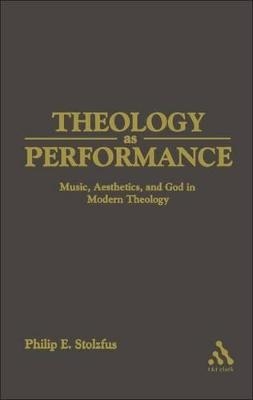
Theology as Performance
T.& T.Clark Ltd (Verlag)
978-0-567-02921-8 (ISBN)
Theology as Performance breaks new ground in the growing conversation between modern theology and philosophical aesthetics. Stoltzfus proposes that significant moments in the Western development of the concept of God, in particular as represented in the figures of Friedrich Schleiermacher, Karl Barth, and Ludwig Wittgenstein, have been deeply influenced by concepts and approaches borrowed from the discipline of musical aesthetics. Each thinker develops fundamentally different ways of writing about God that have in significant respects been derived from each one's reading and writing about music. The aesthetic implications of Schleiermacher's so-called subjectivist turn, Barth's objectivist reaction, and Wittgenstein's language-game pragmatism can thus be fully understood only by attending to the musical culture and distinctly musicological discourses that gave rise to them. Stoltzfus constructs two trajectories of thought with which to trace theological reflection upon music throughout the pre-modern period: the traditions of Orpheus and Pythagoras.
Schleiermacher's aesthetic approach, then, becomes a modern representative of the Orpheus trajectory, and Barth's approach a representative of the Pythagoras trajectory. Stoltzfus interprets Wittgenstein as putting forward a radical critique of these trajectories and pointing toward a third, "performative" theological-aesthetic method. Theology as Performance offers a provocative rethinking of the aesthetic roots of modern theology.
Philip E. Stolzfus isAssistant Professor of Religion, St. Olaf College, Northfield, Minnesota.
Contents; Preface; Resources; Abbreviations; 1.What is 'the Septuagint'?; Terminology; Scope of the Term in Antiquity; Scope of the Term in Contemporary Usage. Primary Sources: Manuscripts and Editions; The Earliest Jewish Manuscripts; The Earliest Christian Manuscripts; Printed Editions; Secondary Sources: the Christian Versions; The Old Latin; The Coptic; The Content of the Septuagint; Differences between Hebrew and Greek Order; The Individual Books of the Septuagint; The Pentateuch; The Histories; The Poetical Books; The Prophets; Summary; Further Reading; 2. Origins: Facts and Fictions; Introduction; The Letter of Aristeas; Outline of Content; Relevance to the Septuagint; Aristobulus; Sources; Aristobulus on the Septuagint; Earlier Versions of the Septuagint?; Relationship between Aristobulus and The Letter of Aristeas; Aristobulus in Context; Further Reading; 3. Origins: Questions and Issues; Dating, Location and Purpose:; The Translation of the Pentateuch; The Translation of the Prophets and the Writings; The Septuagint as a Whole: Theories and Questions:; The 'Texts for Worship' Hypothesis; The 'Texts for Study' Hypothesis; The Question of the Septuagint; Further Reading; 4. The Status of the Septuagint: from Philo to Jerome; Introduction; Philo of Alexandria (c.20 BCE-c.50 CE); Philo on the Making of the Septuagint; Special Features in Philo's Account; Philo on the 'Inspiration' of the Septuagint; A Defence of the Septuagint?; Josephus (37-c.100 CE); Continuation of the Septuagint Legends in Judaism; Rabbinic Sources and the Septuagint; Continuation of the Septuagint Legends in Christianity; The Defence of the Septuagint; The Septuagint and Jewish Alternatives; Augustine and Jerome; Further Reading; 5. Textual Developments to the Fifth Century CE; The Jewish Versions; The kaige Revision; 'Theodotion'; Aquila; Symmachus; Other Jewish Versions; Christian Use of the Versions; The Christian Recensions. The 'Hesychian Recension'; The Hexaplaric Recension; The Lucianic (Antiochian) Recension; Further Reading; 6. Language and Style; Introduction; The Septuagint and Koine Greek; The Septuagint's First Readers; Summary; Translation Technique; 'Literal' and 'Free' Translations; Conclusion; Further Reading; 7.The Use of the Septuagint: from the Beginnings to the Present Day; The LXX and the MT: Interpreting the Differences; Identifying Distinctive Theological Elements; Jewish and Christian Reception History:; Early Jewish Interpretation; Hellenistic Jewish Authors; Apocrypha and Pseudepigrapha; Philo and Josephus; Early Christian Interpretation; Influence of the Septuagint on New Testament Interpretation; Patristic Use of the Septuagint; The Influence of the Septuagint on Biblical Interpretation; Issues in the Patristic Use of the Septuagint; Modern Interest in the Septuagint; The Septuagint and Textual Criticism; Modern Translations; The Septuagint as Christian Scripture; The Septuagint as Jewish Scripture; The Septuagint and Hellenistic Culture; Further Reading; Bibliography; Index of References; Index of Authors.
| Verlagsort | Edinburgh |
|---|---|
| Sprache | englisch |
| Gewicht | 620 g |
| Themenwelt | Kunst / Musik / Theater ► Musik ► Musiktheorie / Musiklehre |
| Geisteswissenschaften ► Philosophie | |
| Religion / Theologie ► Christentum ► Moraltheologie / Sozialethik | |
| ISBN-10 | 0-567-02921-2 / 0567029212 |
| ISBN-13 | 978-0-567-02921-8 / 9780567029218 |
| Zustand | Neuware |
| Haben Sie eine Frage zum Produkt? |
aus dem Bereich


